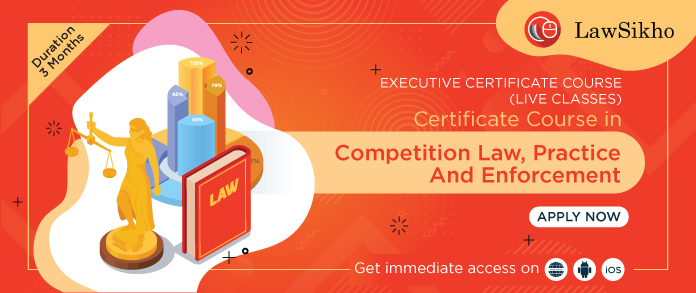This article is penned by Shambhavi Upadhyay, from Symbiosis Law School, NOIDA. It aims at finding the requirement of an LLM for practising competition law in India, by asking important questions that go into the decision making.
Table of Contents
Introduction
With the increasing interest in the field of law, the number of law students graduating every year is increasing as well. Most of these graduates seek a job with a reputed law firm and others either go for litigation or judiciary. One of the planets that lie in the solar system of the Corporate Law is Competition Law. It aims at ensuring that businesses have a fair market competition and also looks out the interest of consumers. Although it is a discipline high in demand, the opportunities available are limited.
To stand out from the rest and to establish a firm ground for yourself it becomes important to do something that makes you different. One such way is to get an LLM in Competition Law, which not only teaches you more about the law and the profession but also raises your employability (at least according to popular belief). But does one need an LLM to practise competition law in India? Let us answer some other questions to find out.
Skills expected from a competition lawyer
A competition lawyer mostly deals with convincing the commissions and tribunals about the merits of the merger or amalgamation or other policies that his/her company is undertaking. To be able to do that, one definitely needs to have some skills handy. Some of these skills are:
Sound comprehension
Analysing a problem and delivering a feasible yet effective solution is a must. Therefore, a lawyer needs to comprehend important information that he/she has to work with. It is also really important for conducting “due diligence”. Due diligence is an inspection or exercise of caution that an organization conducts before moving further with any agreement or contract.
Interpersonal intelligence
Working as a competition lawyer, one needs to have efficient interpersonal skills. As the job requires one to work in a team with fellow lawyers or even with the counsels of the company that one is dealing with, it is important to be able to manage people efficiently. It requires one to be able to understand the person in front and respond accordingly by suitably moulding themselves. It also develops empathy, which in turn helps in reading people and situations better.
Effective communication
It is important that a lawyer knows the 7 C’s of effective communication and uses them for his and his company’s benefit. They are, being – clear, concise, correct (error-free in semantics), concrete, coherent, complete, and courteous. Effective communication skills are not only verbal but also written. It helps in expressing ideas and discussions in a smooth flow. A good communicator is always at an advantage.
Negotiation skills
The job demands the power of persuasion along with effective negotiation skills. It is to see both sides of a coin, hear both the parties, and devise an offer that one cannot refuse. In the corporate world, one cannot be selfish, and thus these skills help in ensuring benefits for your firm, and the other firm as well.
Knowledge and understanding
The most important tool that any lawyer can have is knowledge, of course with the added ability to use it effectively. A competition lawyer needs to have a proper understanding of the laws and the work that is expected of him. A firm grip on the concepts and also which can make him an asset for whichever company he works with.
The course structure of an LLM in Competition Law
Any of these skills talked of above, are not something that cannot be learned without an LLM in Competition Law. What is then that an LLM in Competition law offers?
The course structure that is followed by any university differs according to the university a person is enrolling in. A person can either opt for an LLM in India or from foreign universities like Stanford, Harvard, NYU, etc. Broadly, the courses tend to focus on subjects such as mergers and monopolies, state aid laws, cartels, public sector policy, anti-competitive practices, intellectual property rights, and international competition law.
Given the university from which and the subjects that a person chooses to specialize in, they gain conceptual clarity. The course would include a study of the introduction, history, and international cooperation for competition and related laws. It also includes the study of anti-competitive agreements, their prohibition, and essentials like turnover, the value of assets, joint venture, acquisition, merger and amalgamation, conglomeration, etc. LLM from an Indian university will also teach one about the Competition Commission of India, Competition advocacy and policy, and also the Consumer Protection Act. Most such courses also include practical training of the student.
Would you miss out on anything by not pursuing an LLM?
We have seen the skills required for a competition lawyer, none of which were nonfeasible to attain in absence of an LLM. The course structure adds to the conceptual and basic understanding of the subject. Although these valuable additions are worthy of being sought, it does not make an LLM necessary to practice Competition law in India. There are other ways by which one can add to their skill-set and knowledge. Therefore, LLM is not the only way in which a person can get these gemstones. On the face of it, one would not miss anything significant by not pursuing an LLM in Competition Law.
It is a matter of personal choice, consistency, hard work, and dedication which would help a person gain these added advantages, even without a specialization degree in the subject.
Return on investment
The investment that one would be making by pursuing an LLM abroad, without a scholarship, would be somewhere around 20 to 30 Lakh Indian Rupees a year, including the education and living expenses. In India, LLM in Competition Law specifically is hard to find, people opt for LLMs that are related to the field, like an LLM in Corporate, Trade or Company laws, which may range somewhere between 2-4 Lakh Indian Rupees a year. A degree from a foreign university is always preferable and fruitful as the jurisprudence of Competition Law in the EU or the US is well-developed in comparison to India, where it is comparatively new.
What one expects after completing the degree is a return that helps him/her cover that expense. Given the demand and supply ratio for these jobs in reputed firms, it is still difficult to get that job if you do not have the skills. And a degree does not equate itself with the skills and knowledge of the application.
Fortunately, if a person makes it through and establishes himself/herself at that dream job, the paycheck may vary anywhere between 12 to 17 Lakhs per annum. Again, this is the best-case scenario. Everyone has a different financial condition and these important decisions depend on them. If a person has all the perfect conditions to pursue an LLM, there might not be a need to think twice. But if one’s cost-benefit ratio is unfavourable, one might not want to push those financial boundaries.
Conclusion
It is not by any statute or rule book compulsory to have an LLM in Competition Law to practice it in India. Like any degree, it adds to a person’s Curriculum Vitae and to the knowledge on that subject. It is important to have a good CV, which speaks for your case. It would be appreciated if one has written papers on Competition Law or has participated in moots that on it. Another cherry on the top would be internships with good competition teams if one has already made up their mind of pursuing it during the LLB.
The tag of a good university might help one to gain that placement in a top law firm or MNC. However, what makes the difference, in the long run, is the kind of professional experience and exposure one has achieved. Therefore, a good CV, knowledge of the subject, understanding of the application, and the essential skills are what you really need to practice Competition Law in India.
References
- https://hls.harvard.edu/dept/graduate-program/llm-program/
- https://www.law.nyu.edu/llmjsd/competitioninnovationandinformationlaw/degreerequirements
- https://law.stanford.edu/office-of-student-affairs/the-master-of-laws-llm-degree/
- https://llm-guide.com/lists/top-llm-programs-by-location/top-10-llm-programs-in-india
- https://llm-guide.com/lists/top-llm-programs-by-speciality/top-llm-programs-for-competition-law
LawSikho has created a telegram group for exchanging legal knowledge, referrals and various opportunities. You can click on this link and join:
 Serato DJ Crack 2025Serato DJ PRO Crack
Serato DJ Crack 2025Serato DJ PRO Crack











 Allow notifications
Allow notifications


